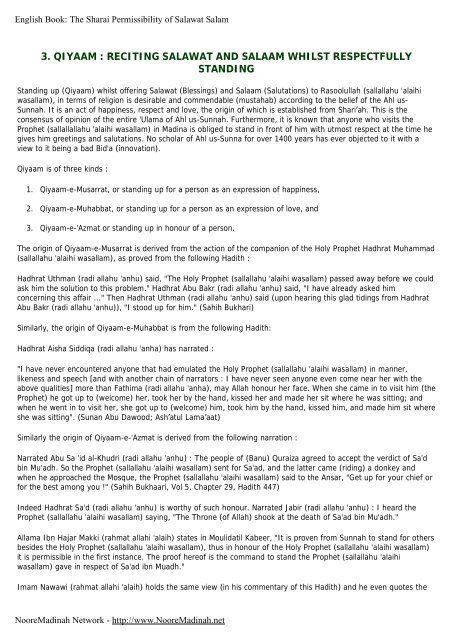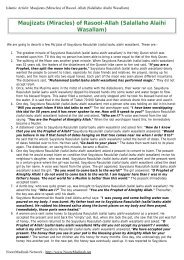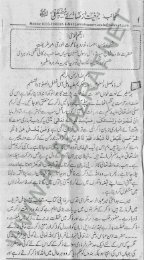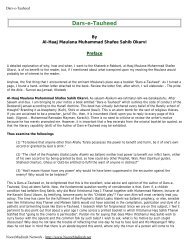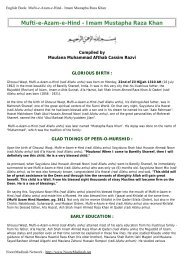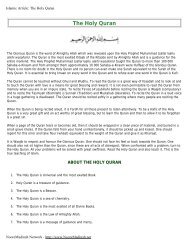The Sharai Permissibility of Salawat & Salam - Noore Madinah ...
The Sharai Permissibility of Salawat & Salam - Noore Madinah ...
The Sharai Permissibility of Salawat & Salam - Noore Madinah ...
Create successful ePaper yourself
Turn your PDF publications into a flip-book with our unique Google optimized e-Paper software.
English Book: <strong>The</strong> <strong>Sharai</strong> <strong>Permissibility</strong> <strong>of</strong> <strong>Salawat</strong> <strong>Salam</strong><br />
3. QIYAAM : RECITING SALAWAT AND SALAAM WHILST RESPECTFULLY<br />
STANDING<br />
Standing up (Qiyaam) whilst <strong>of</strong>fering <strong>Salawat</strong> (Blessings) and Salaam (Salutations) to Rasoolullah (sallallahu 'alaihi<br />
wasallam), in terms <strong>of</strong> religion is desirable and commendable (mustahab) according to the belief <strong>of</strong> the Ahl us-<br />
Sunnah. It is an act <strong>of</strong> happiness, respect and love, the origin <strong>of</strong> which is established from Shari’ah. This is the<br />
consensus <strong>of</strong> opinion <strong>of</strong> the entire 'Ulama <strong>of</strong> Ahl us-Sunnah. Furthermore, it is known that anyone who visits the<br />
Prophet (sallallallahu 'alaihi wasallam) in Madina is obliged to stand in front <strong>of</strong> him with utmost respect at the time he<br />
gives him greetings and salutations. No scholar <strong>of</strong> Ahl us-Sunna for over 1400 years has ever objected to it with a<br />
view to it being a bad Bid'a (innovation).<br />
Qiyaam is <strong>of</strong> three kinds :<br />
1. Qiyaam-e-Musarrat, or standing up for a person as an expression <strong>of</strong> happiness,<br />
2. Qiyaam-e-Muhabbat, or standing up for a person as an expression <strong>of</strong> love, and<br />
3. Qiyaam-e-'Azmat or standing up in honour <strong>of</strong> a person.<br />
<strong>The</strong> origin <strong>of</strong> Qiyaam-e-Musarrat is derived from the action <strong>of</strong> the companion <strong>of</strong> the Holy Prophet Hadhrat Muhammad<br />
(sallallahu 'alaihi wasallam), as proved from the following Hadith :<br />
Hadhrat Uthman (radi allahu 'anhu) said, "<strong>The</strong> Holy Prophet (sallallahu 'alaihi wasallam) passed away before we could<br />
ask him the solution to this problem." Hadhrat Abu Bakr (radi allahu 'anhu) said, "I have already asked him<br />
concerning this affair ..." <strong>The</strong>n Hadhrat Uthman (radi allahu 'anhu) said (upon hearing this glad tidings from Hadhrat<br />
Abu Bakr (radi allahu 'anhu)), "I stood up for him." (Sahih Bukhari)<br />
Similarly, the origin <strong>of</strong> Qiyaam-e-Muhabbat is from the following Hadith:<br />
Hadhrat Aisha Siddiqa (radi allahu 'anha) has narrated :<br />
"I have never encountered anyone that had emulated the Holy Prophet (sallallahu 'alaihi wasallam) in manner,<br />
likeness and speech [and with another chain <strong>of</strong> narrators : I have never seen anyone even come near her with the<br />
above qualities] more than Fathima (radi allahu 'anha), may Allah honour her face. When she came in to visit him (the<br />
Prophet) he got up to (welcome) her, took her by the hand, kissed her and made her sit where he was sitting; and<br />
when he went in to visit her, she got up to (welcome) him, took him by the hand, kissed him, and made him sit where<br />
she was sitting". (Sunan Abu Dawood; Ash’atul Lama’aat)<br />
Similarly the origin <strong>of</strong> Qiyaam-e-'Azmat is derived from the following narration :<br />
Narrated Abu Sa 'id al-Khudri (radi allahu 'anhu) : <strong>The</strong> people <strong>of</strong> (Banu) Quraiza agreed to accept the verdict <strong>of</strong> Sa'd<br />
bin Mu'adh. So the Prophet (sallallahu 'alaihi wasallam) sent for Sa'ad, and the latter came (riding) a donkey and<br />
when he approached the Mosque, the Prophet (sallallahu 'alaihi wasallam) said to the Ansar, "Get up for your chief or<br />
for the best among you !" (Sahih Bukhaari, Vol 5, Chapter 29, Hadith 447)<br />
Indeed Hadhrat Sa'd (radi allahu 'anhu) is worthy <strong>of</strong> such honour. Narrated Jabir (radi allahu 'anhu) : I heard the<br />
Prophet (sallallahu 'alaihi wasallam) saying, "<strong>The</strong> Throne (<strong>of</strong> Allah) shook at the death <strong>of</strong> Sa'ad bin Mu'adh."<br />
Allama Ibn Hajar Makki (rahmat allahi 'alaih) states in Moulidatil Kabeer, "It is proven from Sunnah to stand for others<br />
besides the Holy Prophet (sallallahu 'alaihi wasallam), thus in honour <strong>of</strong> the Holy Prophet (sallallahu 'alaihi wasallam)<br />
it is permissible in the first instance. <strong>The</strong> pro<strong>of</strong> here<strong>of</strong> is the command to stand the Prophet (sallallahu 'alaihi<br />
wasallam) gave in respect <strong>of</strong> Sa'ad ibn Muadh."<br />
Imam Nawawi (rahmat allahi 'alaih) holds the same view (in his commentary <strong>of</strong> this Hadith) and he even quotes the<br />
<strong>Noore</strong><strong>Madinah</strong> Network - http://www.<strong>Noore</strong><strong>Madinah</strong>.net


